Full Disclosure: Clicking on these links could mean a tiny commission for me, at no extra cost to you.
Without proper sleep, the world can appear to be in a haze. Your anxiety can be heightened, your focus and productivity is lacking, you’re unable to retain and remember important information, and your entire life can start to feel like a blur. The following sleeping tips tackle the various factors that may be keeping you up at night, so you can finally get a better night’s rest and start living better during the day.
What’s Keeping You Up At Night?
To improve your sleep, consider the various factors that may be inhibiting your REM and use the appropriate sleeping tip to help you tackle the problem.
Sleeping Tip 1: Anxiety
 Worries and stress are a common thing for all people – from apprehension about your responsibilities at your job, to your family, to your health and finances, it is normal to have stress coming from many sources in your day-to-day life. However, if you are constantly losing sleep over anxiety and having a worsened quality of rest because of it, you may want to look towards a more permanent solution. Try meditating or practicing mindfulness in the evenings to lower your heart rate before bed. But if you find yourself struggling with anxiety during the daytime in addition to at night, browse through some free resources for coping and overcoming your anxiety here.
Worries and stress are a common thing for all people – from apprehension about your responsibilities at your job, to your family, to your health and finances, it is normal to have stress coming from many sources in your day-to-day life. However, if you are constantly losing sleep over anxiety and having a worsened quality of rest because of it, you may want to look towards a more permanent solution. Try meditating or practicing mindfulness in the evenings to lower your heart rate before bed. But if you find yourself struggling with anxiety during the daytime in addition to at night, browse through some free resources for coping and overcoming your anxiety here.
Sleeping Tip 2: Busy Mind
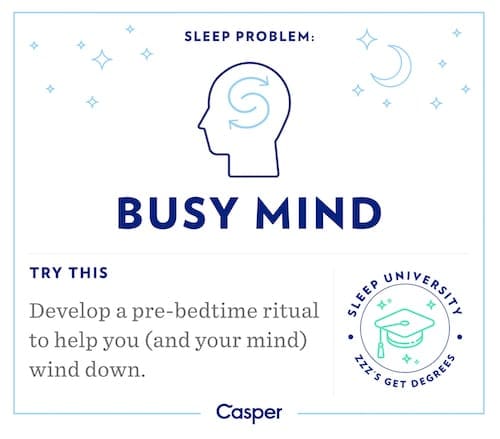 Being busy is a seemingly unavoidable feeling. From going to meetings and appointments for work or managing others, maintaining friendships, relationships and staying in contact with family members, or even worrying about your own health, finances and personal fulfillment, there are endless thoughts that can keep your mind racing when it is time for bed.
Being busy is a seemingly unavoidable feeling. From going to meetings and appointments for work or managing others, maintaining friendships, relationships and staying in contact with family members, or even worrying about your own health, finances and personal fulfillment, there are endless thoughts that can keep your mind racing when it is time for bed.
If you feel wound up when it is time to go to sleep, try meditating each night to signal to your body and mind that it is time to slow down. If that does not work for you, you can supplement this by cutting your caffeine intake in the afternoon. To still have that ritual without consuming as much coffee, try swapping it out for a tea or mug of hot water with lemon.
Sleeping Tip 3: Discomfort
 The most common reason that people can not sleep come bedtime is because they are uncomfortable in at least one way. From muscle aches and pains after a tough workout or an injury, too-tight pajamas or an itchy quilt or comforter, to sharing the bed with a blanket hog, there can easily be multiple causes for nightly discomfort. If you find yourself waking feeling stiff and sore, or lying awake at night feeling restless, you may need to exercise more during the day.
The most common reason that people can not sleep come bedtime is because they are uncomfortable in at least one way. From muscle aches and pains after a tough workout or an injury, too-tight pajamas or an itchy quilt or comforter, to sharing the bed with a blanket hog, there can easily be multiple causes for nightly discomfort. If you find yourself waking feeling stiff and sore, or lying awake at night feeling restless, you may need to exercise more during the day.
Sleeping Tip 4: Hunger
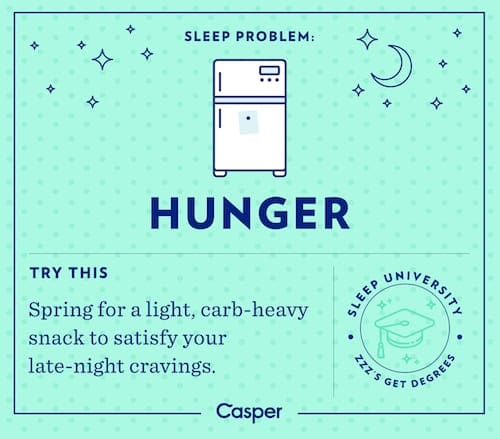 Bedtime snacks are often warned against, as many people believe that a nighttime meal or snack will cause weight gain or heartburn. However, it is much more likely that going to sleep hungry will lead to restless sleep, unhealthy breakfast choices and even morning binges. If you find yourself searching for turkey to induce a food coma at night, instead try to munch on something that will slowly release carbs and actually put you to sleep, such as whole wheat toast or rice.
Bedtime snacks are often warned against, as many people believe that a nighttime meal or snack will cause weight gain or heartburn. However, it is much more likely that going to sleep hungry will lead to restless sleep, unhealthy breakfast choices and even morning binges. If you find yourself searching for turkey to induce a food coma at night, instead try to munch on something that will slowly release carbs and actually put you to sleep, such as whole wheat toast or rice.
Sleeping Tip #5: Noise
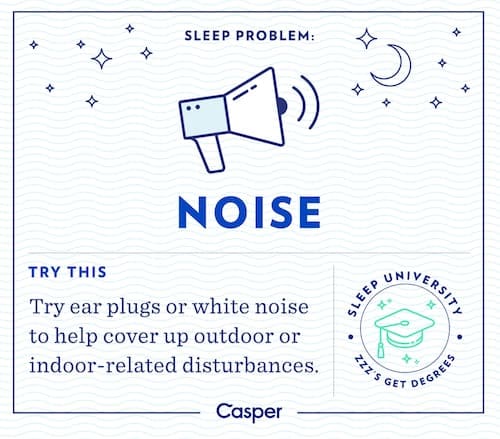 Whether your partner’s snores keep you awake at night, or you can not sleep if it is too quiet, noise can greatly affect one’s ability to fall or stay asleep. If you White noise generators or other ambient noise machines can help drown out sharp sounds such as loud upstairs neighbors, car horns outside or screeching gusts of wind, and they are also beneficial for creating sound that is not distracting for sleepers who feel spooked by a room that does not have enough noise.
Whether your partner’s snores keep you awake at night, or you can not sleep if it is too quiet, noise can greatly affect one’s ability to fall or stay asleep. If you White noise generators or other ambient noise machines can help drown out sharp sounds such as loud upstairs neighbors, car horns outside or screeching gusts of wind, and they are also beneficial for creating sound that is not distracting for sleepers who feel spooked by a room that does not have enough noise.
Sleeping Tip #6: Not Tired
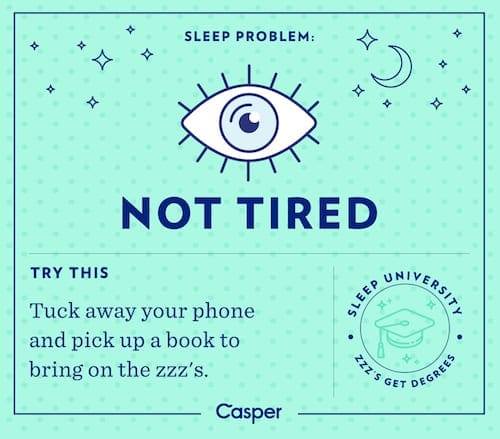
Many parents do not allow their children to have televisions in their rooms out of fear that their kids’ sleep will be ruined by late nights watching cartoons. However, the detrimental effect that is caused by watching tv before bed actually comes from the light emitted by the screen. Televisions, phones, computers and tablets alike all emit blue light, which mimics the sun’s rays and actually wakes you up – even if you are exhausted. Cutting screen time before bed and replacing your scrolling habits with a book or magazine will allow your eyes to rest before your body falls into the same state.
Sleeping Tip #7: Sunday Night Insomnia
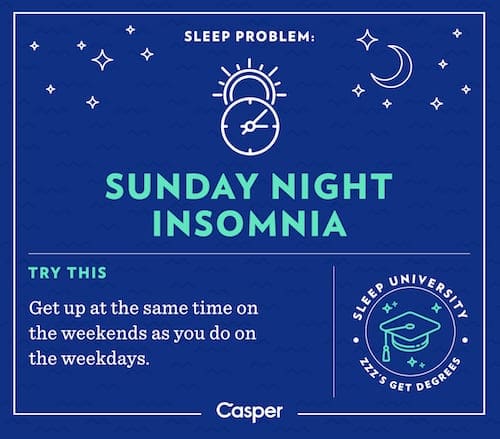 Waking up to an alarm on a weekend may sound like torture, but it may actually help improve your sleep quality. If you find that Monday mornings feel like a tired, groggy, cranky haze, you may benefit from staying on the same sleep schedule seven days a week. If you really want to sleep in, try to wake up only one hour later on Saturday and Sunday than you do on weekdays.
Waking up to an alarm on a weekend may sound like torture, but it may actually help improve your sleep quality. If you find that Monday mornings feel like a tired, groggy, cranky haze, you may benefit from staying on the same sleep schedule seven days a week. If you really want to sleep in, try to wake up only one hour later on Saturday and Sunday than you do on weekdays.
Sleeping Tip #8: Temperature
 When Goldilocks could not fall asleep, it was because the bears’ beds were either too big or too small. Similarly to her predicament, it is very important that your entire sleep experience is tailored to you and feels “just right.” One of the most important things to get right is the temperature of your room at night, and the recommended temperature for your room year round is between 60 and 67 degrees Fahrenheit. However, if you find yourself constantly flipping your pillow over to get to the cold side regardless of the temperature of your room, look into replacing your current pillows with ones that have been proven to stay colder for longer.
When Goldilocks could not fall asleep, it was because the bears’ beds were either too big or too small. Similarly to her predicament, it is very important that your entire sleep experience is tailored to you and feels “just right.” One of the most important things to get right is the temperature of your room at night, and the recommended temperature for your room year round is between 60 and 67 degrees Fahrenheit. However, if you find yourself constantly flipping your pillow over to get to the cold side regardless of the temperature of your room, look into replacing your current pillows with ones that have been proven to stay colder for longer.
There are many reasons why you may not be sleeping at night. So, whether it’s insomnia caused by anxiety or another factor, these helpful sleeping tips should guide you in the right direction to a better sleep.









